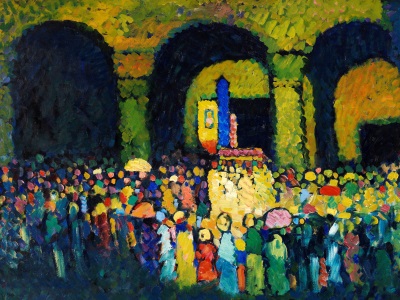It would be an error to think that it is a question of slogans if we speak of the difference between “civil reconciliation” and “a revolutionary new society.” Much more the question is: “What is the most obvious task for the church of Jesus regarding peacemaking and the mission of love?” Is the most important thing to organize the existing efforts towards peace into a single voice, and through the financial management, correspondence, publications, and travel of this organization, spread the message of peace and justice? Or is it the most important thing today that here and there people begin to live together in communities of life and work, combining their energies? Would it be a capricious preemption of a future divine order if we today, believing in the presence of Christ and the loving power of his Spirit, form working groups in which, in practical life, all differences, privileges and class distinctions would be overcome which so cramp and disturb people’s daily lives? How can the public proclamation of the truth in a multitude of media – in meetings, lectures, newspapers, periodicals, or in books – but above all in personal relationships, remain genuine, true, and natural? The first thing we need to get down to should be the simple, practical expression of our new awareness and conscience in our daily lives and work. The complete rooting of the new life in the hard soil of the earth must come to organic growth, piercing ever deeper and more surely the demands of the social conscience and the urge of complete love and justice, in accordance with the “Christ in us.”
What is needed is a work of reconciliation that will overcome all the blockages and barriers in our hearts and in the conditions around us. Everywhere there are things that separate one person from another; everywhere people hold things against each other. They come with their wishes and demands, their complaints and accusations; they feel a lack of genuineness in their mutual assurances of love and respect, of dedication and community, of justice, and friendship. They see how others try to hold on to privileges and property that they have gained, or conversely how they themselves make every effort to obtain property or privileges that they see in the hands of others. Peoples and classes, business competitors, families and individuals – all are part of the fight for existence, the struggle of debit and credit, for profits and advantages; and yet deep down they all feel that it could be different, that the same space in the same world, the same commitment of time and effort could be spent in a different way: no longer against each other, but for each other, no longer in competition and enmity, but in the service of love.
That is why people look again and again to religion, which, after all, has represented this message of a new community; and again and again they turn away from the public presentation of this religion of love, dismayed and perplexed. “Why?” a working man asked me recently after my lecture on “Socialism and Religion” at a trade union meeting in a big city, “Why have the churches and schools always taught the pure teachings of Jesus of Nazareth? Why do they do that without thinking of ordering their lives according to this teaching?” The suspicion crops up again and again that the churches, religious bodies, and Christian officials carry out their work with the intent to pacify the disenfranchised and underprivileged so that they are content to accept their material disadvantage, and to secure for the privileged the undisturbed enjoyment of their material and intellectual advantages.
Reconciliation! Can reconciliation ever be achieved by preaching it without living it? The church of Christ is sent out with the message: “Be reconciled” (2 Cor. 5:20). This is a religious message. Reconciliation with God means an all-embracing reconciliation with one another. The church of Christ is placed as the embassy of a coming world order, as the delegation of a different kingdom in the midst of foreign governments and social bodies. Every member of the organism of Christ is a member of this consecrated, sacrosanct embassy. This fact means that such an embassy cannot be subordinated to the character of the existing world, the existing state order, or the existing stratification of society. As citizens of a different society, all the members of this embassy are foreigners and aliens here. And yet their situation is different from that of other aliens, for their commission knows no other service but that of love and loyalty. They do not feel opposed to the people among whom they live; rather they feel themselves to be advocates for anyone who has to suffer in any way. Moreover, they are citizens of two worlds and therefore continue to share the guilt and misfortune of their fellow human beings. They continue to identify with all who are in need and who become guilty in their need.
The infinite smallness and weakness of such a beginning confronts an infinite power of obstructions. Everything that is unreconciled and unbalanced, unjust and loveless, is active everywhere in full strength. Wherever we look – in ourselves, in our homes, in our villages, and on the streets of our cities – and whatever we learn about social conditions or the relationships between nations: everywhere we come up against mistrust and alienation, demands and complaints, rejection and resentment. Jesus said that any religious rite, any religious sacrifice or consecration, is meaningless if there is a single unreconciled contradiction or an unsettled accusation (Matt. 5:23-24).
That is the most amazing thing in the history of Christendom, that again and again people have found a way to quiet their consciences in religious worship services and devotions, while outside the masses of the deprived banged at the church doors with their heavy accusations and darkened the stained-glass windows. There is no reconciliation with God without reconciliation with humanity. There is no subjective Christianity in the sense of limiting the little individual in his isolated relationship to his personal God, for there is no isolated individual; and there is no God who sees a person separate from that person's connection to others.
To become a Christian and to see God, to have a part in the kingdom of God, means to show mercy to all, to feel a hunger and an insatiable thirst for an all-embracing justice, for serving love and non-violent dedication.
Therefore, today the decisive question is whether in various countries and among various peoples, a spark of God shines out that bears the pure light of Jesus’ reconciliation. Only the great fire of God, who will himself break in in the imminent future, can give these individual sparks a decisive meaning. But even the smallest spark of that coming fire has its effect.
Draft Translation.
Article edited for length and clarity. View original document in our digital archive: Reconciliation Work (1921).


